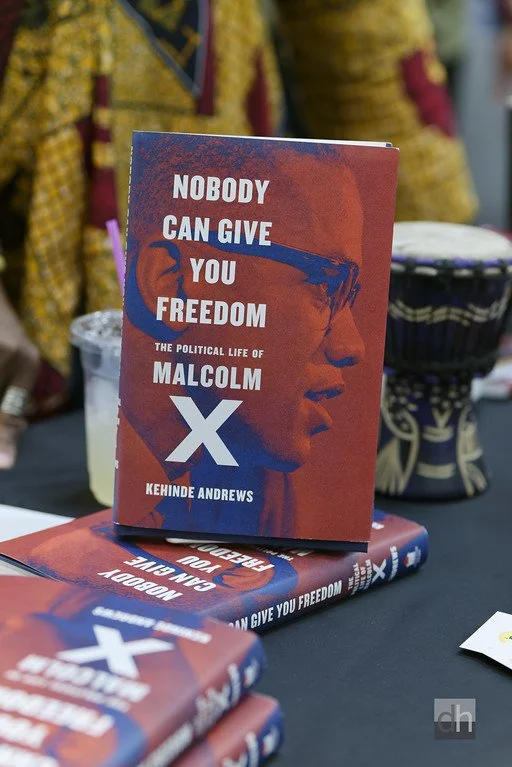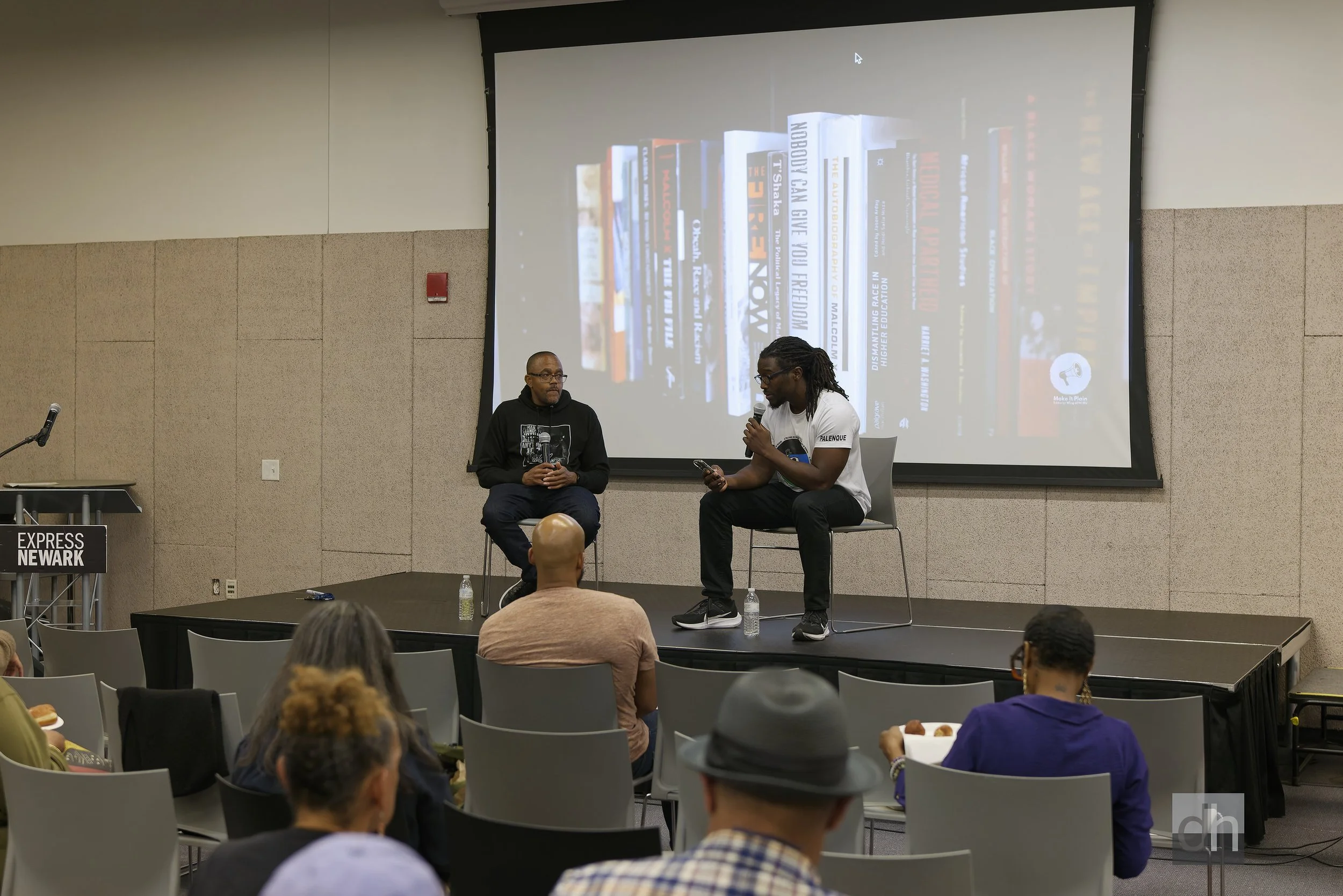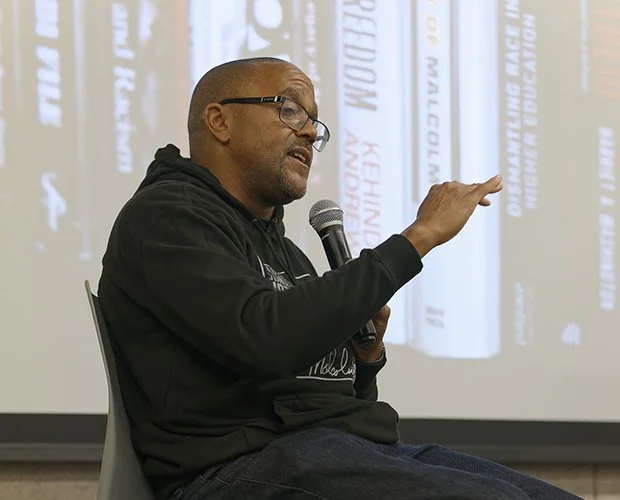Book Review | Nobody Can Give You Freedom
Photo credit: Nobody Can Give You Freedom books at the Kehinde Andrews book event at Express Newark on September 10, 2025. Photo courtesy of Dennis Hill Photography.
Newark, NJ - On Wednesday, September 10, Community Movement Builders (CMB), Newark, hosted a book event with the author of “Nobody Can Give You Freedom: The Political Life of Malcolm X,” Kehinde Andrews.
Andrews is a professor of Black Studies in the UK and co-founder of the Harambee Organisation of Black Unity. He has previously authored five other works.
The book event, which included a viewing of a portion of the documentary by the same name, was coordinated in partnership with the Source of Knowledge bookstore, the Community Media Center at Express Newark, the Malcolm X Commemoration Committee, MAPSO Freedom School and Black Alliance for Peace NY/NJ. Organizers also provided a one-on-one conversation with Andrews to the several dozen community members in attendance. The stated goal of the event for CMB Newark was “to emphasize the work of Malcolm X, while deepening the understanding of the value of organizing.”
In the preface of “Nobody Can Give You Freedom: The Political Life of Malcolm X,” Andrews explains that he “was fortunate to grow up in the wake of the Black Power movement in Britain.” This one sentence prepares readers for what they are about to learn. The book details the politics which are also the foundation of Andrews’ worldview, who understands Malcolm X to be “the intellectual we need to reshape the future.”
Andrews writes, “This is not a biography; there are plenty of places you can go to learn about the man. My aim is to simply outline Malcolm’s political ideas, his program for revolution, which was clear and spelled out before he died.”
Photo credit: Author Kehinde Andrews interviewed by CMB Newark co-leader, JP, at the Nobody Can Give You Freedom book at Express Newark on September 10, 2025. Photo courtesy of Dennis Hill Photography.
Debunking the myth: Malcolm X’s core message is to organize
According to Andrews, “Now, a hundred years after his birth, it is the perfect time to rid ourselves of the Malcolm myths and truly engage with his politics of liberation.”
The Autobiography of Malcolm X, ghostwritten by Alex Haley, which later became the basis for the biopic directed by Spike Lee are often noted as entry points to the story of Malcolm X. However, neither allots the time and attention to Malcolm X’s founding of the Organization of Afro-American Unity (OAAU), which was his primary objective during the months leading up to his assassination.
The erasure of this effort has resulted in what Andrews deems a “dangerous Malcolm myth,” one that purports that Malcolm X, “offers no concrete revolution for the Black masses.” Thus, the book is a journey through the many misrepresentations surrounding Malcolm X, as well as the failure of many published works to address the mission and constitution of the OAAU.
One method Andrews uses to reorient readers away from the myth, and toward the actual organizing effort, is via an analysis of the phrases most commonly associated with Malcolm X’s life. One example of this is the phrase, “by any means necessary,” which is the reductive version of Malcolm X’s philosophical dialectic, commonly used to associate him with violence. Andrews explains that the organizing focus was actually self-defense and identifies the OAAU's plan of teaching self-protection methods. The analysis includes Malcolm X’s understanding of the dangers faced by Black people around the world, therefore necessitating defensive strategies. Andrews writes, “Violence was, and remains, ever present, the backdrop that both defines and maintains our oppression.”
Core argument: Integration was always going to be a problem
According to Andrews, “No amount of reform, protest, and legislation can make society work for those it was not built for.”
The idea that racism presents a fundamental obstacle to the freedom of Black people is revisited often throughout the work. Andrews explains this as the core belief of Malcolm X, which countered Martin Luther King Jr.’s efforts. Andrews writes, “For Malcolm, the West was irredeemable, with racism being the basic operating system. This fundamental truth about society shaped his analysis and necessitated a revolutionary solution.” Suggesting that Malcolm X dismissed the idea that Black people could achieve real change through the Civil Rights movement.
The book also highlights Malcolm X’s belief that Black people should shun the idea of working within the rules of a government that continuously denies their basic human rights. Malcolm X often sounded the alarm, within his speeches and writings, regarding any attempt to assimilate. Andrews writes, “Malcolm was trying to warn the Black population that they were not citizens and therefore could never be included equally in the national project.” The OAAU instead would focus on an international effort to organize Black people and a blanket refusal to settle for what Malcolm X termed “token integration,” which Andrews states, “are not incremental steps on the long march to freedom but actually represent an illusion of progress.”
As previously stated, the ultimate goal of “Nobody Can Give You Freedom” is to provide readers with evidence of Malcolm X’s vision for an international collective of Black people working toward freedom via a revolutionary strategy. Andrews hopes to motivate readers to participate in this collective struggle.
Andrews writes, “We also need to accept that the mechanism for our liberation does not exist and set about building the global Black nation. We need to do this step-by-step, joining together the work we are already doing and creating an organization that has the capacity to move us toward freedom.”
Photo credit: Author Kehinde Andrews, addressing participants at the Nobody Can Give You Freedom book at Express Newark on September 10, 2025. Photo courtesy of Dennis Hill Photography.
A reader’s take
The book is written in the first-person perspective, which may prove difficult for those more comfortable with sourced works that skip personal narratives. This work presents the contradictions between the myths and Malcolm’s actual organizing efforts.
Readers must not lose sight of the fact that the text is Andrews’ interpretation of the words of Malcolm X. However, Kehinde Andrews is not Malcolm X. He is a professor, who invested a great deal of time and energy into tracing the writings, speeches and statements of Malcolm X, but admits, “I obviously cannot know what Malcolm would actually say had he lived.”
The book masterfully connects readers to the issues most relevant to organizing Black people across the diaspora, and more specifically the OAAU, using Malcolm X’s own words, which Andrews traveled across the UK and an ocean to research.
Finally, it is undeniable that Andrews has an agenda, and this work is presented in an effort to gain support for that agenda. Fortunately for readers, Andrews shares his approach to the pursuit of liberation with the one and only, Malcolm X.
This is likely why the book closes with a call to action to join the Harambee organization. After which Andrews writes, “The purpose of this book is to explain the need for the Harambee Organisation of Black Unity. So I thank you all for supporting Malcolm’s revolutionary vision for change. Nobody can give you freedom. We have to take it.”



